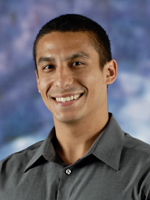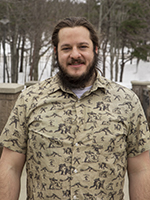Participants: |
|

|
Jemima Akinsanya I am originally from Nigeria and grew up in New Jersey. I completed Neurology Residency at Emory University June 2020. Currently I am a clinical neuroimmunology fellow at the NIH in my second year of fellowship. My primary research goal during my fellowship is to conduct clinical trials to study neuroinflammatory diseases. My focus is on therapeutics for multiple sclerosis (MS) and Progressive Multifocal Leukoencephalopathy (PML). I also have a strong interest in health disparities research which I am currently conducting through collaboration with the National Advisory Neurological Disorders and Stroke Council (NANDSC) Working Group for Health Disparities and Inequities in Neurological Disorder. Following my fellowship, I plan to continue my research career as an academic neuroimmunologist with a focus on health disparities research. |

|
Johnathan Borland Johnathan is a postdoctoral researcher in Dr. Robert Meisel's lab at the University of Minnesota. His graduate research investigated sex differences in oxytocin modulation of social reward. His postdoctoral research investigates the neural mechanisms mediating the rewarding properties of aggressive and sexual interactions using female models. His long term goals are to continue to investigate the neural mechanisms underlying the rewarding properties of different social behaviors and to mentor scientists from underrepresented backgrounds. He is a member of the Society for Behavioral Neuroendocrinology, the International Behavioral Neuroscience Society, the Organization for the Study of Sex Differences and the Japan Neuroscience Society. He was born in San Jose, CA, grew up in Hamilton, MA, and received his undergraduate (Emory University) and graduate (Georgia State University) education in Atlanta, GA. He enjoys basketball, swimming, snorkeling and running. |

|
Carlos Cardenas-Iniguez Carlos Cardenas-Iniguez (pronouns he/him/his) is a T32 NIEHS Postdoctoral Fellow in the Herting Lab at the Keck School of Medicine of University of Southern California. Carlos earned his PhD in Psychology and Integrative Neuroscience from the University of Chicago in 2019. His research focuses on using the ABCD Study dataset to explore the impact of social stratification on the environments in which people live, and how these environments, in turn, impact neural and cognitive development and mental health. His research interests also include the implementation of spatial analysis, critical race theory, and anti-racism principles in neuroscience/psychology research. |

|
Timothy Hines My dad was in the military so I was born in Germany and my family moved around a few times before getting stationed at Ft. Bragg, North Carolina. In high school I was on the soccer and wrestling teams and I graduated a year early. For undergrad I went to Appalachian State University to study psychology. During this time I was also on the rugby team and worked in Dr. Mark Zrull’s lab studying the impacts of environmental enrichment on rat behavior. I graduated in 2012 with a B.A. and B.S. in Psychology and minors in German and Chemistry. I then joined Dr. Deanna Smith’s lab in the Biological Sciences department at the University of South Carolina for graduate school. My thesis work, which I completed in 2018, focused on the regulation of dynein-dependent axonal transport. In 2018, I moved to Bar Harbor, Maine for a postdoc in Dr. Robert Burgess’s lab at The Jackson Laboratory. Here, I am studying the cellular mechanisms that cause the rare neuromuscular disorder, Charcot-Marie-Tooth disease (CMT), which can be caused by mutations in over 100 different genes. More specifically I am focused on how mutations in tRNA synthetases, which are ubiquitously expressed enzymes critical for the fundamental process of protein synthesis, lead to degeneration of motor axons. In the future I plan to run my own lab group combining my knowledge of axon biology, genetics, and disease modeling to better understand how genetic mutations lead to neurodegenerative disorders. Outside of the lab I enjoy hiking, gardening, going to heavy metal concerts, ice fishing, and lifting weights. |

|
Dan Landayan My father and mother emigrated from the Philippines to California. I became the first person in my family to get into college. During my undergraduate, my favorite course was introductory psychology. It was here I learned of Sigmund Freud’s theory of the mind and the underlying principles he established to explain human behavior. I was also intrigued by his paradigm of the mind as a black box: first, a stimulus enters the “black box.” Second, something mysterious and unexplainable occurs within the black box. Then finally, a behavior is measured. From this point on, I was obsessed with the inner machinations of the nervous system. For my graduate work, I focused on understanding how the brain encodes motivated behaviors to satisfy thirst and hunger using the fruit fly model. As a post-doctoral scholar, I want to translate my fly expertise to the study of how motivated social behaviors are encoded in the mammalian brain. In the longer term I would like to explore the circuit interactions that modulate different innate behaviors. |

|
Deborah Rose I am a Neurology Resident at Duke University Medical Center. I am a first-generation Jamaican-American and was born and raised in New Jersey. I completed my undergraduate education at Cornell University and medical school at the Loyola University Chicago Stritch School of Medicine. Following residency at Duke, I will be pursuing an NINDS/NIA Clinical Fellowship. Currently, my research is focused on exploring ways to optimize diagnostic screening modalities for Alzheimer’s disease (AD) and examining the biopsychosocial and mechanisms underlying racial disparities in the development of mild cognitive impairment and AD. I have a particular interest in studying the role that adverse childhood experiences and chronic toxic stress may play in the pathogenesis of AD and contribute to the racial disparities seen in the condition. |